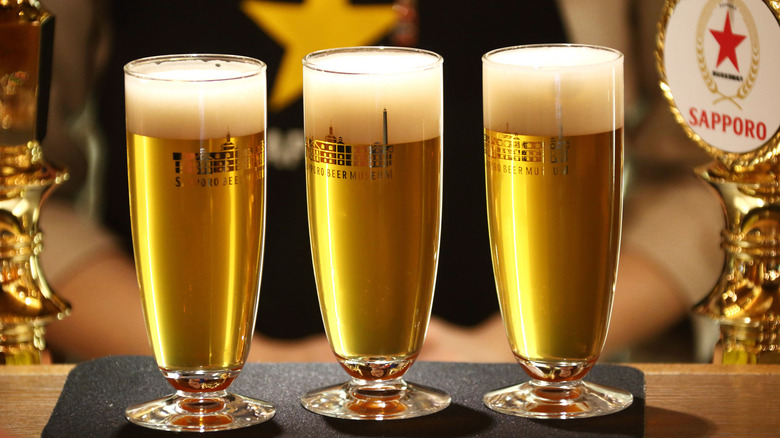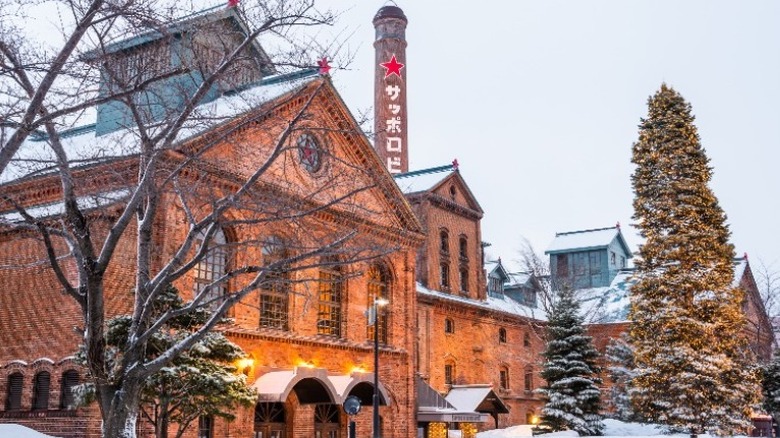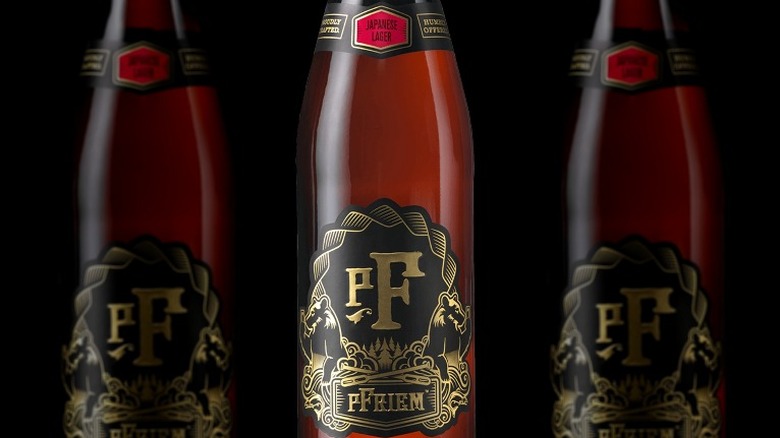Everything You Need To Know About Rice-Based Beers
Most beers are made with standard ingredients: hops, barley or malt, yeast, and water. However, traditional Japanese lagers like Sapporo and Asahi are made with at least a third of the grain in the traditional recipes coming from rice (via Porch Drinking). While some products brewed for the U.S. might have a different ingredient breakdown, the recipe for beer brewed in Japan will have that classic rice percentage.
While not all rice-based beers are gluten-free, some are, notes Food & Wine, and their light, fresh taste is easily accessible to a wide variety of beer drinkers. Surprisingly, Budweiser also includes rice in their beer, writes Japan Beer Times, which often makes people assume rice beers are of lower quality, though that is normally not the case.
There are many reasons to brew with rice. Barley, one of the traditional grains for brewing American beer, can make the beer hazy, according to Porch Drinking. Barley is protein-heavy, which causes that cloudiness. Rice, which has significantly less protein, provides a much cleaner, clear look we associate with Japanese beers (via Porch Drinking). Also, because the rice flavor is so neutral, it provides a hint of sweetness but still lets the other flavors shine through. These flavors include hops, like the Sorachi Ace hops created by Sapporo, which give the beer a slightly lemony taste.
Rice beer brewing has been around for centuries
The two oldest breweries in Japan, Sapporo and Kirin, were founded in the late 1800s and influenced by German beer brewers (via Kirin). These brewers adhered to the German beer purity law Reinheitsgebot, established in 1516, which dictated that beer could only be made from hops, water, barley, and yeast (via NPR).
Sapporo's first brewmaster, Seibei Nakagawa, trained at the Berlin Beer Brewing Company in Germany before returning to Japan and being hired to run the brand-new brewery on the island of Hokkaido (via The Manual).
Similarly, Kirin was originally founded by Norwegian-American brewer William Copeland as Spring Valley Brewery (via Reference for Business). When that business closed, a group including Americans and Europeans as well as leading Japanese businessmen — including then president of Mitsubishi Yanosuke Iwasaki — reopened the brewery as the Japan Brewery Company (via Kirin). They imported a German brewer and started producing German-style lagers in 1888.
However, with some of the required German beer ingredients in lower supply, Japan could easily turn to rice, per pFriem Family Brewers. They had been making sake from rice for many years, which Japan Beer Times points out is actually technically a rice beer itself, as sake is made from a grain, not fruit.
Craft brewers are becoming more interested in rice beers
It's not just traditional Japanese beers that use rice — a number of craft brewers are starting to experiment with it as well.
In Hood River, Oregon, pFriem Family Brewers' Japanese Lager puts their own spin on the style, using a base of Jasmine rice and infusing it with additional scents and flavors of Japan, including Shiso plum and green tea (via their site). Josh Pfriem, brewmaster and co-founder, told Mashed, "We love the crisp, but silky texture the rice gives our Japanese Lager. You can find complexity in many forms in beer, from loud to subtle flavors. Rice has a way of giving a gentle nuance that allows other flavors to sing."
Many craft breweries have had a lot of success with rice-based beers. Chuckanut Brewing in Bellingham, Washington, won a Gold Medal at the North American Beer Awards in 2019 for their Asian Style Lager (via Chuckanut Brewery). And it's an international phenomenon as well. Belgium-based Bossuwé Brewing Co. won the 2019 World Beer Award for World's Best Specialty Rice beer for their Betty B. Japanese-style lager.
Breweries are also using rice in different beer styles as well. Michigan's Kuhnhenn Brewing Company's DRIPA is a double IPA made with American long grain rice, which won a Gold Medal for IPAs at the 2012 World Beer Cup (via Kuhnhenn Brewing Company). And Anderson Valley Brewing Company in California makes their Black Rice Ale, a nut brown ale they state is brewed with black rice, also known as "forbidden rice" as at one time it was only allowed to be eaten by China's emperor (via The Spruce Eats).


